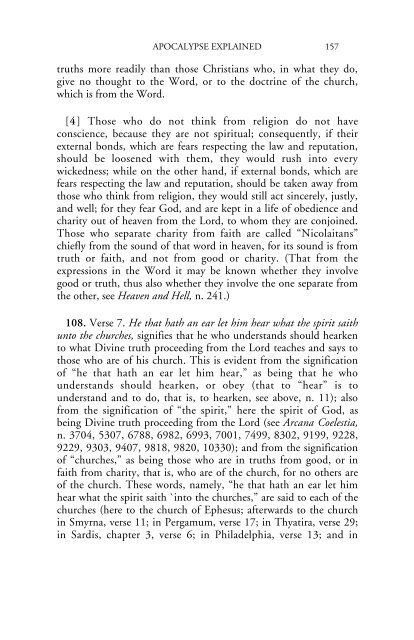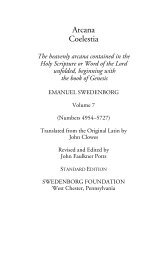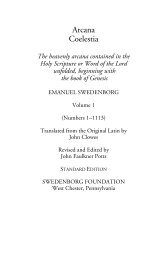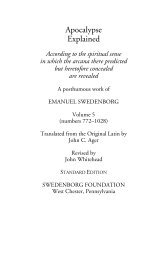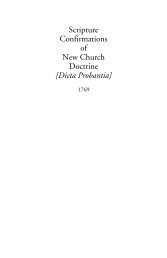- Page 1 and 2:
TEACH FOR CANADATeach for Canada is
- Page 3:
ContentsEditor’s PrefaceRevelatio
- Page 6 and 7:
APOCALYPSE EXPLAINED 3Critical note
- Page 8 and 9:
APOCALYPSE EXPLAINED 512. And I tur
- Page 10 and 11:
APOCALYPSE EXPLAINED 7which will ce
- Page 12 and 13:
APOCALYPSE EXPLAINED 9“quickly”
- Page 14 and 15:
APOCALYPSE EXPLAINED 11and “John
- Page 16:
APOCALYPSE EXPLAINED 13that those w
- Page 20 and 21:
APOCALYPSE EXPLAINED 17acknowledges
- Page 22 and 23:
APOCALYPSE EXPLAINED 19for this rea
- Page 24 and 25:
APOCALYPSE EXPLAINED 21To do is to
- Page 26 and 27:
APOCALYPSE EXPLAINED 23delight of t
- Page 28 and 29:
APOCALYPSE EXPLAINED 25that is, who
- Page 30 and 31:
APOCALYPSE EXPLAINED 27It is said
- Page 32 and 33:
APOCALYPSE EXPLAINED 2924. And from
- Page 34 and 35:
APOCALYPSE EXPLAINED 31The “parac
- Page 36 and 37:
APOCALYPSE EXPLAINED 33Heaven and H
- Page 38:
APOCALYPSE EXPLAINED 35“daughters
- Page 41 and 42:
APOCALYPSE EXPLAINED 38219, 222). T
- Page 43 and 44:
APOCALYPSE EXPLAINED 40meant, or, w
- Page 45 and 46:
APOCALYPSE EXPLAINED 42In these pas
- Page 47 and 48:
APOCALYPSE EXPLAINED 44As sitting o
- Page 49 and 50:
APOCALYPSE EXPLAINED 46Jerusalem an
- Page 51 and 52:
APOCALYPSE EXPLAINED 48internal or
- Page 53 and 54:
APOCALYPSE EXPLAINED 50Sing unto Go
- Page 55 and 56:
APOCALYPSE EXPLAINED 5238. And they
- Page 57 and 58:
APOCALYPSE EXPLAINED 54what good an
- Page 59 and 60:
APOCALYPSE EXPLAINED 56(These words
- Page 61 and 62:
APOCALYPSE EXPLAINED 58their recept
- Page 64 and 65:
APOCALYPSE EXPLAINED 61“brethren
- Page 66 and 67:
APOCALYPSE EXPLAINED 63church, see
- Page 68 and 69:
APOCALYPSE EXPLAINED 65The revelati
- Page 70 and 71:
APOCALYPSE EXPLAINED 67doctrine, th
- Page 72 and 73:
APOCALYPSE EXPLAINED 69opened. This
- Page 74 and 75:
APOCALYPSE EXPLAINED 71In Ezekiel:H
- Page 76 and 77:
APOCALYPSE EXPLAINED 73golden girdl
- Page 78 and 79:
APOCALYPSE EXPLAINED 75church make
- Page 80 and 81:
APOCALYPSE EXPLAINED 77midst” sig
- Page 82 and 83:
APOCALYPSE EXPLAINED 79That by “t
- Page 84 and 85:
APOCALYPSE EXPLAINED 819:12, 31) si
- Page 86 and 87:
APOCALYPSE EXPLAINED 83“Moses”
- Page 88 and 89:
APOCALYPSE EXPLAINED 85they were di
- Page 90 and 91:
APOCALYPSE EXPLAINED 8766. Verse 14
- Page 92 and 93:
Moreover, for the same reason:APOCA
- Page 94 and 95:
APOCALYPSE EXPLAINED 91celestial go
- Page 96 and 97:
APOCALYPSE EXPLAINED 93Incline thin
- Page 98 and 99:
APOCALYPSE EXPLAINED 95I lifted up
- Page 100 and 101:
APOCALYPSE EXPLAINED 97therefrom th
- Page 102 and 103:
APOCALYPSE EXPLAINED 99“brass”
- Page 104 and 105:
APOCALYPSE EXPLAINED 101The earth i
- Page 106 and 107:
APOCALYPSE EXPLAINED 103When Jesus
- Page 108 and 109:
APOCALYPSE EXPLAINED 10572. Verse 1
- Page 110 and 111: APOCALYPSE EXPLAINED 107By the “h
- Page 112 and 113: APOCALYPSE EXPLAINED 10974. And his
- Page 114 and 115: APOCALYPSE EXPLAINED 111from cogita
- Page 116 and 117: APOCALYPSE EXPLAINED 113No one hath
- Page 118 and 119: APOCALYPSE EXPLAINED 115caverns of
- Page 120 and 121: APOCALYPSE EXPLAINED 117And they br
- Page 122 and 123: APOCALYPSE EXPLAINED 119Fear not (D
- Page 124 and 125: APOCALYPSE EXPLAINED 121In Luke:Jes
- Page 126 and 127: APOCALYPSE EXPLAINED 123love to him
- Page 128 and 129: APOCALYPSE EXPLAINED 125signified,
- Page 130 and 131: APOCALYPSE EXPLAINED 127immediately
- Page 132 and 133: APOCALYPSE EXPLAINED 129Revelation
- Page 134 and 135: APOCALYPSE EXPLAINED 13192. In the
- Page 136 and 137: APOCALYPSE EXPLAINED 133saith he th
- Page 138 and 139: APOCALYPSE EXPLAINED 135signified t
- Page 140 and 141: APOCALYPSE EXPLAINED 137I will set
- Page 142 and 143: APOCALYPSE EXPLAINED 139which is ex
- Page 144 and 145: APOCALYPSE EXPLAINED 141Blessed are
- Page 146 and 147: APOCALYPSE EXPLAINED 143differs fro
- Page 148 and 149: APOCALYPSE EXPLAINED 145apostles”
- Page 150 and 151: APOCALYPSE EXPLAINED 147[3] Lest, t
- Page 152 and 153: APOCALYPSE EXPLAINED 149Everyone th
- Page 154 and 155: APOCALYPSE EXPLAINED 151name of a d
- Page 156 and 157: APOCALYPSE EXPLAINED 153n. 809, 916
- Page 158 and 159: APOCALYPSE EXPLAINED 155significati
- Page 162 and 163: APOCALYPSE EXPLAINED 159My mother a
- Page 164 and 165: APOCALYPSE EXPLAINED 161signify suc
- Page 166 and 167: APOCALYPSE EXPLAINED 163Because the
- Page 168 and 169: APOCALYPSE EXPLAINED 165[2] From th
- Page 170 and 171: APOCALYPSE EXPLAINED 167the midst o
- Page 172 and 173: APOCALYPSE EXPLAINED 169self and th
- Page 174 and 175: APOCALYPSE EXPLAINED 171and in Matt
- Page 176 and 177: APOCALYPSE EXPLAINED 173means of ul
- Page 178 and 179: APOCALYPSE EXPLAINED 175Christian w
- Page 180 and 181: APOCALYPSE EXPLAINED 177[8] I once
- Page 182 and 183: APOCALYPSE EXPLAINED 179spiritual s
- Page 184 and 185: APOCALYPSE EXPLAINED 181looks only
- Page 186 and 187: APOCALYPSE EXPLAINED 183not the Wor
- Page 188 and 189: APOCALYPSE EXPLAINED 185who are in
- Page 190 and 191: APOCALYPSE EXPLAINED 187Then many n
- Page 192 and 193: APOCALYPSE EXPLAINED 189121. Verse
- Page 194 and 195: APOCALYPSE EXPLAINED 191disciples,
- Page 196 and 197: APOCALYPSE EXPLAINED 193By this is
- Page 198 and 199: APOCALYPSE EXPLAINED 195“ten days
- Page 200 and 201: APOCALYPSE EXPLAINED 197hell. But w
- Page 202 and 203: APOCALYPSE EXPLAINED 199death” is
- Page 204 and 205: APOCALYPSE EXPLAINED 201state of in
- Page 206 and 207: APOCALYPSE EXPLAINED 203In the cons
- Page 208 and 209: APOCALYPSE EXPLAINED 205That the wa
- Page 210 and 211:
APOCALYPSE EXPLAINED 207spiritual w
- Page 212 and 213:
APOCALYPSE EXPLAINED 209Bring water
- Page 214 and 215:
APOCALYPSE EXPLAINED 211not appear
- Page 216 and 217:
APOCALYPSE EXPLAINED 213the king of
- Page 218 and 219:
APOCALYPSE EXPLAINED 215Cherubim, a
- Page 220 and 221:
APOCALYPSE EXPLAINED 217only, and n
- Page 222 and 223:
APOCALYPSE EXPLAINED 219Also that h
- Page 224 and 225:
APOCALYPSE EXPLAINED 221The elders
- Page 226 and 227:
APOCALYPSE EXPLAINED 223In heart, h
- Page 228 and 229:
APOCALYPSE EXPLAINED 225consecrated
- Page 230 and 231:
APOCALYPSE EXPLAINED 227truth; the
- Page 232 and 233:
APOCALYPSE EXPLAINED 229To “adult
- Page 234 and 235:
APOCALYPSE EXPLAINED 231They should
- Page 236 and 237:
APOCALYPSE EXPLAINED 233spheres fro
- Page 238 and 239:
APOCALYPSE EXPLAINED 235Our fathers
- Page 240 and 241:
APOCALYPSE EXPLAINED 237Jehovah com
- Page 242 and 243:
APOCALYPSE EXPLAINED 239148. And up
- Page 244 and 245:
APOCALYPSE EXPLAINED 241The city of
- Page 246 and 247:
APOCALYPSE EXPLAINED 243works and c
- Page 248 and 249:
APOCALYPSE EXPLAINED 245[2] Since t
- Page 250 and 251:
APOCALYPSE EXPLAINED 247from the Lo
- Page 252 and 253:
APOCALYPSE EXPLAINED 249is nothing
- Page 254 and 255:
APOCALYPSE EXPLAINED 251Say to this
- Page 256 and 257:
APOCALYPSE EXPLAINED 253I will smit
- Page 258 and 259:
APOCALYPSE EXPLAINED 255The Lord’
- Page 260 and 261:
APOCALYPSE EXPLAINED 257reason that
- Page 262 and 263:
APOCALYPSE EXPLAINED 2596148, 9809,
- Page 264 and 265:
APOCALYPSE EXPLAINED 261is only wil
- Page 266 and 267:
APOCALYPSE EXPLAINED 263from these
- Page 268 and 269:
APOCALYPSE EXPLAINED 265one who tea
- Page 270 and 271:
APOCALYPSE EXPLAINED 267When Jehora
- Page 272 and 273:
APOCALYPSE EXPLAINED 269sees truth
- Page 274 and 275:
APOCALYPSE EXPLAINED 271be in the s
- Page 276 and 277:
APOCALYPSE EXPLAINED 273“Having t
- Page 278 and 279:
APOCALYPSE EXPLAINED 2752508, 3815,
- Page 280 and 281:
APOCALYPSE EXPLAINED 277their reins
- Page 282 and 283:
APOCALYPSE EXPLAINED 279contrary se
- Page 284 and 285:
APOCALYPSE EXPLAINED 281according t
- Page 286 and 287:
APOCALYPSE EXPLAINED 283175a. I wil
- Page 288 and 289:
APOCALYPSE EXPLAINED 285here also t
- Page 290 and 291:
APOCALYPSE EXPLAINED 287The peoples
- Page 292 and 293:
APOCALYPSE EXPLAINED 289occupy thei
- Page 294 and 295:
APOCALYPSE EXPLAINED 291These thing
- Page 296 and 297:
APOCALYPSE EXPLAINED 293By “the h
- Page 298 and 299:
APOCALYPSE EXPLAINED 295by means of
- Page 300 and 301:
APOCALYPSE EXPLAINED 297[2] Those,
- Page 302 and 303:
APOCALYPSE EXPLAINED 299Woe unto hi
- Page 304 and 305:
APOCALYPSE EXPLAINED 301something f
- Page 306 and 307:
APOCALYPSE EXPLAINED 303the light o
- Page 308 and 309:
APOCALYPSE EXPLAINED 305in explaini
- Page 310 and 311:
APOCALYPSE EXPLAINED 307In Isaiah:I
- Page 312 and 313:
APOCALYPSE EXPLAINED 309Revelation
- Page 314 and 315:
APOCALYPSE EXPLAINED 311God. Rememb
- Page 316 and 317:
APOCALYPSE EXPLAINED 313end, which
- Page 318 and 319:
APOCALYPSE EXPLAINED 315and prayers
- Page 320 and 321:
APOCALYPSE EXPLAINED 317Conceive ch
- Page 322 and 323:
APOCALYPSE EXPLAINED 319[7] That
- Page 324 and 325:
APOCALYPSE EXPLAINED 321“guide th
- Page 326 and 327:
APOCALYPSE EXPLAINED 323church, and
- Page 328 and 329:
APOCALYPSE EXPLAINED 325heaven know
- Page 330 and 331:
APOCALYPSE EXPLAINED 327they are sp
- Page 332 and 333:
APOCALYPSE EXPLAINED 329I will rans
- Page 334 and 335:
APOCALYPSE EXPLAINED 331Likewise th
- Page 336 and 337:
APOCALYPSE EXPLAINED 333In the begi
- Page 338 and 339:
APOCALYPSE EXPLAINED 335In Mark:Be
- Page 340 and 341:
APOCALYPSE EXPLAINED 337Be wakeful,
- Page 342 and 343:
APOCALYPSE EXPLAINED 339and action
- Page 344 and 345:
APOCALYPSE EXPLAINED 341in the Word
- Page 346 and 347:
APOCALYPSE EXPLAINED 343[3] From th
- Page 348 and 349:
APOCALYPSE EXPLAINED 3452231, 2233,
- Page 350 and 351:
APOCALYPSE EXPLAINED 347such it is
- Page 352 and 353:
APOCALYPSE EXPLAINED 349Those four
- Page 354 and 355:
APOCALYPSE EXPLAINED 351[3] But on
- Page 356 and 357:
APOCALYPSE EXPLAINED 353Awake, awak
- Page 358 and 359:
APOCALYPSE EXPLAINED 3551462, 5700,
- Page 360 and 361:
APOCALYPSE EXPLAINED 357“False pr
- Page 362 and 363:
APOCALYPSE EXPLAINED 359[17] In the
- Page 364 and 365:
APOCALYPSE EXPLAINED 361The Ancient
- Page 366 and 367:
APOCALYPSE EXPLAINED 363signify tho
- Page 368 and 369:
APOCALYPSE EXPLAINED 365And as whit
- Page 370 and 371:
APOCALYPSE EXPLAINED 367reception,
- Page 372 and 373:
APOCALYPSE EXPLAINED 369All shall w
- Page 374 and 375:
APOCALYPSE EXPLAINED 371That all th
- Page 376 and 377:
APOCALYPSE EXPLAINED 373[5] Since
- Page 378 and 379:
APOCALYPSE EXPLAINED 375measure in
- Page 380 and 381:
APOCALYPSE EXPLAINED 377this is wha
- Page 382 and 383:
APOCALYPSE EXPLAINED 379To serve Hi
- Page 384 and 385:
APOCALYPSE EXPLAINED 381truth in ul
- Page 386 and 387:
APOCALYPSE EXPLAINED 383205. He tha
- Page 388 and 389:
APOCALYPSE EXPLAINED 385as God, and
- Page 390 and 391:
APOCALYPSE EXPLAINED 387He swore un
- Page 392 and 393:
APOCALYPSE EXPLAINED 389the Lord ha
- Page 394 and 395:
APOCALYPSE EXPLAINED 391From this i
- Page 396 and 397:
APOCALYPSE EXPLAINED 393gate or doo
- Page 398 and 399:
APOCALYPSE EXPLAINED 395things that
- Page 400 and 401:
APOCALYPSE EXPLAINED 397Judah hath
- Page 402 and 403:
APOCALYPSE EXPLAINED 399That the ea
- Page 404 and 405:
APOCALYPSE EXPLAINED 401for the Lor
- Page 406 and 407:
APOCALYPSE EXPLAINED 403celestial c
- Page 408 and 409:
APOCALYPSE EXPLAINED 405those affec
- Page 410 and 411:
APOCALYPSE EXPLAINED 407213. And to
- Page 412 and 413:
APOCALYPSE EXPLAINED 409because tho
- Page 414 and 415:
APOCALYPSE EXPLAINED 411Set thee up
- Page 416 and 417:
APOCALYPSE EXPLAINED 413“Jehovah
- Page 418 and 419:
APOCALYPSE EXPLAINED 415I said, I a
- Page 420 and 421:
APOCALYPSE EXPLAINED 417In Daniel:B
- Page 422 and 423:
APOCALYPSE EXPLAINED 419“Lightnin
- Page 424 and 425:
APOCALYPSE EXPLAINED 421A book writ
- Page 426 and 427:
APOCALYPSE EXPLAINED 423was after H
- Page 428 and 429:
APOCALYPSE EXPLAINED 425God. That
- Page 430 and 431:
APOCALYPSE EXPLAINED 427Here “Luc
- Page 432 and 433:
APOCALYPSE EXPLAINED 429These words
- Page 434 and 435:
In Matthew:APOCALYPSE EXPLAINED 431
- Page 436 and 437:
APOCALYPSE EXPLAINED 433land of Egy
- Page 438 and 439:
APOCALYPSE EXPLAINED 435Every kingd
- Page 440 and 441:
APOCALYPSE EXPLAINED 437written to
- Page 442 and 443:
APOCALYPSE EXPLAINED 439lukewarm,
- Page 444 and 445:
APOCALYPSE EXPLAINED 441charity is
- Page 446 and 447:
APOCALYPSE EXPLAINED 443I am the wa
- Page 448 and 449:
APOCALYPSE EXPLAINED 445the church,
- Page 450 and 451:
APOCALYPSE EXPLAINED 447seen to be
- Page 452 and 453:
APOCALYPSE EXPLAINED 449profane is
- Page 454 and 455:
APOCALYPSE EXPLAINED 451they join t
- Page 456 and 457:
APOCALYPSE EXPLAINED 453their intel
- Page 458 and 459:
APOCALYPSE EXPLAINED 4556015, 6651,
- Page 460 and 461:
APOCALYPSE EXPLAINED 457and as thos
- Page 462 and 463:
APOCALYPSE EXPLAINED 459In thy wisd
- Page 464 and 465:
APOCALYPSE EXPLAINED 461He who does
- Page 466 and 467:
APOCALYPSE EXPLAINED 463understandi
- Page 468 and 469:
APOCALYPSE EXPLAINED 465justificati
- Page 470 and 471:
APOCALYPSE EXPLAINED 467shall not c
- Page 472 and 473:
APOCALYPSE EXPLAINED 469deprive tho
- Page 474 and 475:
APOCALYPSE EXPLAINED 471and see, wh
- Page 476 and 477:
APOCALYPSE EXPLAINED 473are cast of
- Page 478 and 479:
APOCALYPSE EXPLAINED 475These thing
- Page 480 and 481:
[14] In Lamentations:APOCALYPSE EXP
- Page 482 and 483:
APOCALYPSE EXPLAINED 479eyes of the
- Page 484 and 485:
APOCALYPSE EXPLAINED 481Also that a
- Page 486 and 487:
APOCALYPSE EXPLAINED 483Jehovah sai
- Page 488 and 489:
APOCALYPSE EXPLAINED 485and “they
- Page 490 and 491:
APOCALYPSE EXPLAINED 487The Lord wi
- Page 492 and 493:
APOCALYPSE EXPLAINED 489From this i
- Page 494 and 495:
APOCALYPSE EXPLAINED 491understandi
- Page 496 and 497:
APOCALYPSE EXPLAINED 493such that i
- Page 498 and 499:
APOCALYPSE EXPLAINED 495good which
- Page 500 and 501:
APOCALYPSE EXPLAINED 497Coelestia,
- Page 502 and 503:
APOCALYPSE EXPLAINED 499sons of Zio
- Page 504 and 505:
242e. Like things are signified by:
- Page 506 and 507:
APOCALYPSE EXPLAINED 503Jesus said
- Page 508 and 509:
APOCALYPSE EXPLAINED 505significati
- Page 510 and 511:
APOCALYPSE EXPLAINED 507conjunction
- Page 512 and 513:
APOCALYPSE EXPLAINED 509neighbor is
- Page 514 and 515:
APOCALYPSE EXPLAINED 511seeing and
- Page 516 and 517:
APOCALYPSE EXPLAINED 513being justi
- Page 518 and 519:
APOCALYPSE EXPLAINED 515They that h
- Page 520 and 521:
APOCALYPSE EXPLAINED 517of My Fathe
- Page 522 and 523:
APOCALYPSE EXPLAINED 519charity, se
- Page 524 and 525:
APOCALYPSE EXPLAINED 521faith in hi
- Page 526 and 527:
APOCALYPSE EXPLAINED 523by such con
- Page 528 and 529:
APOCALYPSE EXPLAINED 525“Zion”a
- Page 530 and 531:
APOCALYPSE EXPLAINED 527signifies i
- Page 532 and 533:
APOCALYPSE EXPLAINED 529Do not disg
- Page 534 and 535:
APOCALYPSE EXPLAINED 531[7] From th
- Page 536 and 537:
APOCALYPSE EXPLAINED 533If with a t
- Page 538 and 539:
APOCALYPSE EXPLAINED 535in respect
- Page 540 and 541:
APOCALYPSE EXPLAINED 537The widows
- Page 542 and 543:
APOCALYPSE EXPLAINED 539signifies t
- Page 544 and 545:
APOCALYPSE EXPLAINED 541Also by the
- Page 546 and 547:
APOCALYPSE EXPLAINED 54311. Thou ar
- Page 548 and 549:
APOCALYPSE EXPLAINED 545according t
- Page 550 and 551:
APOCALYPSE EXPLAINED 547n. 219, 220
- Page 552 and 553:
APOCALYPSE EXPLAINED 549262. As of
- Page 554 and 555:
APOCALYPSE EXPLAINED 551and voices,
- Page 556 and 557:
APOCALYPSE EXPLAINED 553[3] The “
- Page 558 and 559:
APOCALYPSE EXPLAINED 555I saw thron
- Page 560 and 561:
APOCALYPSE EXPLAINED 557“Old men
- Page 562 and 563:
APOCALYPSE EXPLAINED 559Thou showes
- Page 564 and 565:
APOCALYPSE EXPLAINED 561I saw, and
- Page 566 and 567:
APOCALYPSE EXPLAINED 563Thou hast w
- Page 568 and 569:
APOCALYPSE EXPLAINED 565I heard one
- Page 570 and 571:
APOCALYPSE EXPLAINED 567The lamp of
- Page 572 and 573:
APOCALYPSE EXPLAINED 569I will shut
- Page 574 and 575:
APOCALYPSE EXPLAINED 571This treats
- Page 576 and 577:
APOCALYPSE EXPLAINED 573Jehovah hat
- Page 578 and 579:
APOCALYPSE EXPLAINED 575falsities t
- Page 580 and 581:
APOCALYPSE EXPLAINED 577and they ha
- Page 582 and 583:
APOCALYPSE EXPLAINED 579the likenes
- Page 584 and 585:
APOCALYPSE EXPLAINED 581Coelestia,
- Page 586 and 587:
APOCALYPSE EXPLAINED 583When Moses
- Page 588 and 589:
APOCALYPSE EXPLAINED 585“Judah”
- Page 590 and 591:
APOCALYPSE EXPLAINED 587This treats
- Page 592 and 593:
APOCALYPSE EXPLAINED 589hath given
- Page 594 and 595:
APOCALYPSE EXPLAINED 591that guards
- Page 596 and 597:
APOCALYPSE EXPLAINED 593royal minis
- Page 598 and 599:
APOCALYPSE EXPLAINED 595and it is n
- Page 600 and 601:
APOCALYPSE EXPLAINED 597The inhabit
- Page 602 and 603:
APOCALYPSE EXPLAINED 599[10] In the
- Page 604 and 605:
APOCALYPSE EXPLAINED 601[15] But in
- Page 606 and 607:
APOCALYPSE EXPLAINED 603[embroidery
- Page 608 and 609:
APOCALYPSE EXPLAINED 605Jehovah fou
- Page 610 and 611:
APOCALYPSE EXPLAINED 607against tru
- Page 612 and 613:
APOCALYPSE EXPLAINED 609All the flo
- Page 614 and 615:
APOCALYPSE EXPLAINED 611because “
- Page 616 and 617:
APOCALYPSE EXPLAINED 613283b. [3] T
- Page 618 and 619:
APOCALYPSE EXPLAINED 615[7] That
- Page 620 and 621:
APOCALYPSE EXPLAINED 617Divine, whi
- Page 622 and 623:
APOCALYPSE EXPLAINED 619[16] In Hos
- Page 624 and 625:
APOCALYPSE EXPLAINED 621that He is
- Page 626 and 627:
APOCALYPSE EXPLAINED 623are meant b
- Page 628 and 629:
APOCALYPSE EXPLAINED 625Glory and h
- Page 630 and 631:
APOCALYPSE EXPLAINED 627sense of th
- Page 632 and 633:
APOCALYPSE EXPLAINED 629from the Lo
- Page 634 and 635:
APOCALYPSE EXPLAINED 631(Of this me
- Page 636 and 637:
APOCALYPSE EXPLAINED 633“To creat
- Page 638 and 639:
APOCALYPSE EXPLAINED 635Jehovah wil
- Page 640 and 641:
APOCALYPSE EXPLAINED 637heaven and
- Page 642 and 643:
APOCALYPSE EXPLAINED 639therefore t
- Page 644 and 645:
APOCALYPSE EXPLAINED 641295c. [4] T
- Page 646 and 647:
APOCALYPSE EXPLAINED 643multiplicat
- Page 648 and 649:
APOCALYPSE EXPLAINED 645Critical No
- Page 650 and 651:
APOCALYPSE EXPLAINED 64716. The Lat
- Page 652 and 653:
APOCALYPSE EXPLAINED 64929. For “


